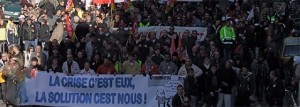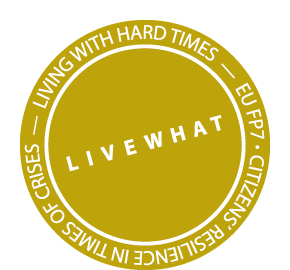Objectives
 LIVEWHAT has three main objectives:
LIVEWHAT has three main objectives:
A descriptive objective namely, to provide systematic evidence on the ways in which European citizens respond – both individually and collectively – to the economic crises and the policy responses to such crises. This is achieved through multi-dimensional data collection covering policy responses (e.g. policy measures, public discourses by political elites), individual responses (e.g. retreating into the private sphere, changing attitudes and behaviors), and collective responses (e.g. engaging in collective action, developing alternative forms of resilience).
An explanatory objective namely, to advance knowledge on the connections between individual factors and contextual factors, while also looking into the ways in which European citizens respond to the economic crises and the policy responses to such crises. This is achieved through a research design that assesses the relationship between economic crises, policy responses, and citizens’ resilience based on both observational and experimental data. Concurrently, emphasis is placed on cross-national variations in terms of the impact of the economic crises and the nature of the national legal-institutional systems.
A practical and policy-oriented objective: To suggest a number of good practices as to how European policy-makers and ordinary citizens will be able to deal with the economic crises, both at social and political levels. This is achieved through an articulated plan for the dissemination of the project findings that takes place at three levels: policy, general public and scientific levels. The dissemination activities also include the organization of a summer school on the topic of the project, the production of a documentary video on topic of “citizens and the crisis,” and the compilation of a handbook of good practices providing the policy-makers and practitioners at national and EU levels with guidance on how to cope with the negative consequences of the economic crises.
The main research questions underpinning LIVEWHAT’s oblectives are:
Four analytical distinctions are deployed in order to address the above questions. There are: a) citizens may respond individually (e.g. changing attitudes and behaviors) or collectively (e.g. engaging in collective action); b) citizens may respond privately (e.g. changing lifestyle) or publicly (expressing discontent in the media; c) citizens may respond politically (e.g. voting for a populist party) or non-politically (by broadening their social ties); d) in addition to studying ordinary citizens’ resilience, LIVEWHAT addresses policy responses to crises in order to confront them with those of the citizenry and to determine whether citizens respond directly to economic crises or indirectly via their resilience to those policy responses.
